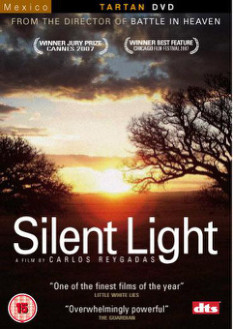I start this list with SILENT LIGHT, by Carlos Reygadas.

At first glance, I didn't quite know what to make of the film - it's slow moving and very artistic. The story follows a deeply religious Mennonite family but focuses upon the actions and reactions of three people: the husband, Johann, his wife, Esther, and his mistress, Marianne. It's clear that Johann loves his wife and family but he's truly drawn to Esther and feels as though she is his better match and truer love. Johann is tormented with falling in love with Marianne because he doesn't want to hurt Esther, whom he's been completely forthcoming with about the affair, but cannot stand the thought of losing either women.
The film brings to light the dilemma lots of people must face in life: Passion verses Duty. Johann and Esther are in a passionless marriage with seven fair-headed children. It's obvious they love each other and their children. They've made a commitment, under God, and Johann sees it as his duty to remain married to Esther and provide their children with the best life possible. Esther is very much aware of Marianne and the affair and suffers in silence as it is her duty to be the best wife and mother she can be - no matter the circumstances. Their stoicism is painful - to watch and for them to live.
But when Johann is with Marianne, he is filled with passion. The chemistry between the two is apparent and energized. Marianne is also tormented because she's in love with Johann yet knows that they will never be together. She also feels sad for Esther because she knows that even though Johann fulfills his husbandly duties with Esther, the fire in his heart burns for her.
I have to say that I honestly didn't like Johann that much. I felt his "honesty" to be brutal and careless. I cared much more for Esther and Marianne, which I finally decided that the story was about anyway. Both of these women were in love with this one man - who couldn't fully give himself to either one of them. They were both settling. I don't know who was more flawed, or even if one was more flawed than the other(s).
The story of this tormented trio is told beautifully with long quite shots that capture the stoic essence of a Mennonite lifestyle. The story does have resolution but I'm not quite sure how I feel about the ending. I think Reygadas employs some supernatural imagery that bothered me at the time. To me, the use of this abrogated the honesty portrayed in the story up to that point. I think the final decision could have still been the same without the use of unnatural happenings. However, this wasn't enough to sway me away from the film.
I recommend watching this film at least three times: Once to take it all in as a whole; Once to follow and contemplate the story and; Once to absorb the visually mesmerizing camera work. Below is the trailer.
I think my next favorite movie of the decade will be a bit more uplifting.
No comments:
Post a Comment